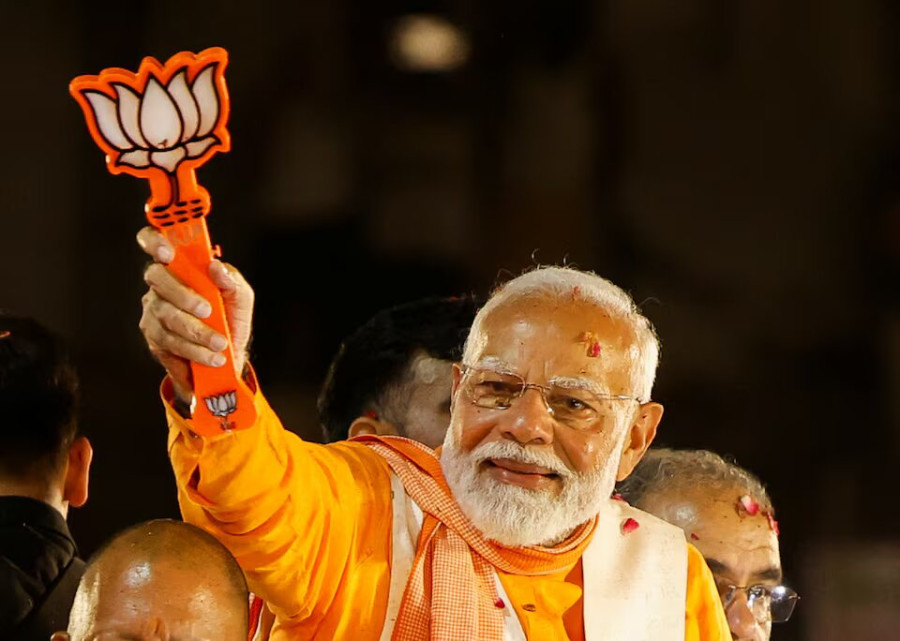Columns
Dance of democracy in India
The BJP's strategy of leveraging Hindutva and identity politics has had limited success.
Sambridh Ghimire
The 2024 Indian general elections, a landmark in the country's democratic journey, have brought significant shifts in political dynamics. The elections have not only reshaped the landscape of Indian politics but also highlighted the evolving nature of voter behaviour, coalition politics and regional influences. This piece delves into the key aspects of the elections, examining the performance of major political parties, the role of coalition partners, the resurgence of the Indian National Congress (INC) and the implications for future governance.
BJP: Dominant yet challenged
The Bharatiya Janata Party (BJP), led by Prime Minister Narendra Modi, emerged as the single largest party in the 2024 elections but fell short of securing a majority in the Lok Sabha, the lower house of Parliament. The BJP secured 240 seats, a significant drop from the 303 seats it held in the previous term. This shortfall underscores a shift in voter sentiment. It presents challenges for the party as it seeks to form a stable government with the help of its coalition partners in the National Democratic Alliance (NDA).
The BJP's performance in key states like Uttar Pradesh (UP), Maharashtra and West Bengal was particularly telling. Despite strong pre-election predictions and robust campaigning, the party experienced setbacks in these crucial states, which play a pivotal role in determining the overall outcome of national elections. The loss of significant seats in these regions indicates the limitations of a centrally driven campaign and highlights the importance of addressing state-specific issues and dynamics.
Coalition dynamics
The reliance on coalition partners has become increasingly apparent for the BJP. The return of key allies such as Janata Dal (United) [JDU] and Telugu Desam Party (TDP) to the NDA fold reflects the necessity of strategic alliances in the current political scenario. Both the JDU and the TDP had previously exited the coalition but were brought back into the fold as the BJP recognised the need for additional support to secure a majority.
The demands from coalition partners for significant cabinet positions, such as Home Ministry for the JDU and Speaker for the TDP, highlight the high stakes involved in these alliances. The coalition partners' leverage underscores their strategic importance and the need for the BJP to carefully manage these relationships to ensure a cohesive and stable government. The negotiations and compromises required in this context are indicative of the complex dynamics that underpin coalition politics in India.
Resurgent Congress
One notable outcome of the 2024 elections has been the resurgence of the Indian National Congress (INC). The Congress increased its seat count to 99, significantly improving from the 52 seats it held in the previous term. This resurgence is attributed to a focused campaign strategy that emphasised social justice themes, caste mobilisation and economic inequality. Rahul Gandhi, the Congress leader, maintained a consistent message that resonated with various voter demographics, particularly in rural and Dalit constituencies.
The Congress's ability to secure the position of opposition leader marks a significant recovery and positions the party as a formidable force in the opposition. Its success in mobilising support through a well-coordinated campaign and strategic alliances with other opposition parties reflects a shift in voter sentiment and a demand for an alternative to the BJP's narrative.
INDIA
The INDIA alliance, comprising various opposition parties, demonstrated surprising traction despite lacking a single leader or a common platform. This alliance coordinated effectively and presented a united front, even with internal differences and challenges. The focus on regional issues and local alliances played a crucial role in their electoral gains, as evidenced by the understanding between the Congress and the Aam Aadmi Party (AAP) in Punjab.
INDIA alliance's ability to gain significant ground despite being outspent and facing various obstacles, such as arrests and frozen bank accounts, underscores the importance of coalition politics in India. The alliance's success in mobilising voters and presenting a credible alternative to the BJP highlights the potential for opposition parties to challenge the dominant narrative and influence the political discourse.
Regional dynamics
The 2024 elections reinforced the complexity of regional dynamics in Indian politics. States like Uttar Pradesh, Maharashtra and West Bengal played pivotal roles in shaping the overall outcome. The BJP's underperformance in these states, despite strong pre-election predictions, indicates the limitations of national campaigns and the importance of state-specific strategies.
In Uttar Pradesh, for example, the NDA won only 37 of the state's 80 seats. Various factors contributed to this outcome, including local anti-incumbency, strategic candidate nominations and effective opposition alliances. The election results in Maharashtra and West Bengal also highlighted the significance of regional dynamics, with local issues and alliances playing crucial roles in determining voter behaviour.
Hindutva and identity politics
The BJP's strategy of leveraging Hindutva and divisive identity politics appeared to have limited success in this election. High-profile speeches and inflammatory rhetoric by BJP leaders, including Prime Minister Modi, did not translate into expected electoral gains in key constituencies like Ayodhya and Banswara. This outcome suggests a possible voter fatigue with polarising narratives and a demand for governance focused on development and economic issues.
The mixed outcome of identity politics indicates the evolving nature of voter behaviour in India. While such strategies have proven effective in the past, their limited success in the 2024 elections suggests a growing demand for inclusive governance and a focus on substantive issues that impact the everyday lives of voters.
The path forward
As the BJP prepares to form a new government on June 8, the challenges of navigating coalition politics and addressing diverse regional expectations will be paramount. The necessity for a "grand federal bargain" and the accommodation of various regional interests will be crucial for maintaining stability and ensuring effective governance.
The upcoming state elections in Maharashtra, Haryana and Jharkhand will serve as further litmus tests for the BJP's strategies and coalition management. The ability to secure victories in these states will significantly influence the power dynamics within the NDA and impact the broader political landscape.
The ruling party's ability to address regional aspirations, manage coalition dynamics, and focus on inclusive development will shape the future governance landscape in India. The 2024 elections have underscored the importance of strategic alliances, the evolving nature of voter behaviour, and the need for a governance approach that transcends polarising narratives and addresses the substantive issues facing the nation.




 22.12°C Kathmandu
22.12°C Kathmandu















